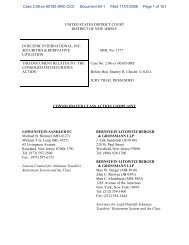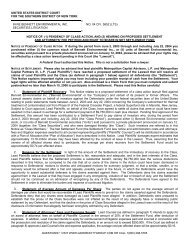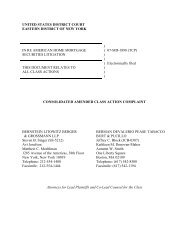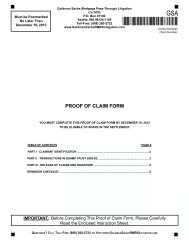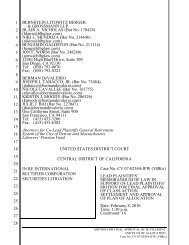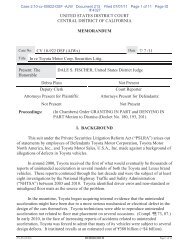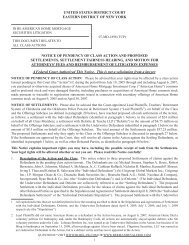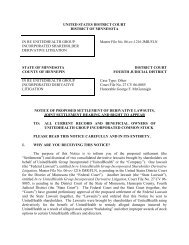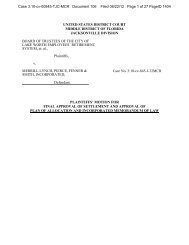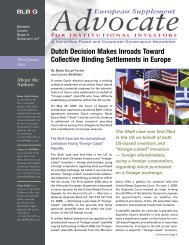as <strong>the</strong> Humanitarian Law Center, <strong>the</strong> Belgrade Center forHuman Rights and <strong>the</strong> Helsinki Committee for HumanRights in Serbia. (Most observers have also given praise forachievements in o<strong>the</strong>r areas.)Vladimir Petrovic, an academic who was an analyst in<strong>the</strong> war crimes prosecu<strong>to</strong>r’s office when first inter<strong>view</strong>edfor this article, described <strong>the</strong> problem as “<strong>the</strong> vacancy in<strong>the</strong> middle.” Though <strong>the</strong> ICTY started with some relativelylow-level offenders, it eventually developed a <strong>to</strong>p-downstrategy. Serbia’s War Crimes Chamber, in contrast, couldtake a bot<strong>to</strong>m-up approach – starting with <strong>the</strong> lowest-leveloffenders and moving up <strong>to</strong> <strong>the</strong> mid-level commandersoutside <strong>the</strong> ICTY’s range of cases.“The hope was that we would meet somewhere in <strong>the</strong>middle,” Petrovic said. If this convergence fails <strong>to</strong> takeplace, he added, it will create a significant hole in <strong>the</strong> legalrecord established by <strong>the</strong> cases.A debate remains over <strong>the</strong> severity of this shortcoming,as well as its causes. Competing <strong>view</strong>s over <strong>the</strong>se issueshave created tension between Vukcevic’s office andKandic’s Humanitarian Law Center – two institutionsostensibly on <strong>the</strong> same side of war crimes issues, led by twoindividuals whose public statements about <strong>the</strong> importanceof accountability efforts often echo each o<strong>the</strong>r.Kandic believes that <strong>the</strong> indictments and some of <strong>the</strong>chamber’s rulings show an intention <strong>to</strong> minimize <strong>the</strong>responsibility of <strong>the</strong> state of Serbia, and <strong>to</strong> focus blameinstead on individual bad apples at <strong>the</strong> lower level. Oneof <strong>the</strong> goals of war crimes trials is <strong>to</strong> establish individualcriminal responsibility for atrocities, something Kandicreadily acknowledges. (One <strong>the</strong>ory in <strong>the</strong> field of transitionaljustice is that individualizing crimes can help prevent victimpopulations from holding grudges against entire groupsof people.) Still, she contends that indictments that moreaggressively move up <strong>the</strong> chain of command and betterestablish <strong>the</strong> context of <strong>the</strong> crimes would place a moreappropriate emphasis on state institutions. This would bemore consistent with <strong>the</strong> record established by <strong>the</strong> ICTY– that much of <strong>the</strong> Serb wartime leadership engaged in ajoint-criminal enterprise during <strong>the</strong> conflict.Greater state responsibility might also support legal<strong>the</strong>ories of liability that Serbia owes reparations <strong>to</strong> victimsof <strong>the</strong> wars. Bosnia-Herzegovina sued Serbia before <strong>the</strong>International Court of Justice for alleged violations of<strong>the</strong> Genocide Convention. In a 2007 ruling, <strong>the</strong> ICJ heldthat <strong>the</strong> Srebrenica massacre amounted <strong>to</strong> genocide butthat Serbia was not directly responsible for <strong>the</strong> acts carriedout by <strong>the</strong> forces in <strong>the</strong> area, <strong>the</strong> Republika Srpska army.The court did hold that Serbia violated <strong>the</strong> conventionby failing <strong>to</strong> s<strong>to</strong>p <strong>the</strong> killings and failing <strong>to</strong> turn over keysuspects. (Among <strong>the</strong> controversies of <strong>the</strong> case, <strong>the</strong> courtdid not require Serbia <strong>to</strong> turn over documents that mighthave shed more light on <strong>the</strong> alleged participation ofYugoslavia’s leadership.)Vukcevic's office has contended that Kandic, who istrained as a sociologist and not a lawyer, is incorrect in herassessments of its performance, and that cases have onlybeen limited by <strong>the</strong> evidence available. For example, in<strong>the</strong> Lovas case against former army officials, among o<strong>the</strong>rdefendants, for <strong>the</strong> killing of 70 civilians in Lovas, Croatia,in 1991, Kandic criticized <strong>the</strong> indictment for not targetingany army generals. Vukcevic issued a public response that<strong>the</strong> “<strong>the</strong> indictment included all individuals for whomit was possible <strong>to</strong> find evidence of involvement” and that“<strong>the</strong>re was no evidence of [higher-ranking army officers]having any knowledge of <strong>the</strong> events in Lovas ei<strong>the</strong>r beforeor during" <strong>the</strong> commission of <strong>the</strong> crimes.In responding <strong>to</strong> questions for this article, Vukcevicsaid that most of <strong>the</strong> higher-ranking officials have alreadybeen indicted by <strong>the</strong> ICTY. He said his team operates by<strong>the</strong> principles of "independence, resistance <strong>to</strong> all sorts ofpressures (political ones in particular), and <strong>the</strong> equality oftreatment for all irrespective of <strong>the</strong>ir ethnic backgrounds,religious beliefs or positions in <strong>the</strong> political and commandstructures." He added that his office is in <strong>the</strong> early stagesof potential cases against “individuals who occupied highpositions in <strong>the</strong> state system” during <strong>the</strong> wars.The Belgrade Center for Human Rights, which untilrecently was led by ano<strong>the</strong>r of <strong>the</strong> region’s most respectedactivists (and scholars), Vojin Dimitrijevic, who died Oct. 5at <strong>the</strong> age of 81, does not believe that <strong>the</strong> prosecu<strong>to</strong>r’s office“is avoiding <strong>the</strong> prosecution of <strong>the</strong> <strong>to</strong>pmost army and policeofficers,” according <strong>to</strong> a report issued earlier this year. Theorganization instead blames obstructive forces within<strong>the</strong> government and <strong>the</strong> challenges posed by regionalcooperation, with so many witnesses outside Serbia’sborder. The report noted a number of complications,including that a “considerable number of <strong>the</strong> Army ofSerbia current command staff” fought during <strong>the</strong> Kosovowar, and that former Milosevic spokesman Dacic (nowPrime Minister) had a prominent role in <strong>the</strong> government asa deputy prime minister.One of <strong>the</strong> most high-profile and controversial of <strong>the</strong>early cases before <strong>the</strong> War Crimes Chamber was broughtin 2005, after <strong>the</strong> Humanitarian Law Center acquired atape of <strong>the</strong> no<strong>to</strong>rious Scorpions paramilitary unit executingsix Muslims during <strong>the</strong> time of <strong>the</strong> Srebrenica massacresin July 1995. The killings <strong>to</strong>ok place in Trnovo, RepublikaSrpska, where <strong>the</strong> unit had taken <strong>the</strong>ir captives. TheHumanitarian Law Center made <strong>the</strong> tape available <strong>to</strong> <strong>the</strong>ICTY, which showed it at <strong>the</strong> Milosevic trial, and <strong>to</strong> <strong>the</strong>media, whose broadcasting of <strong>the</strong> footage was seen as animportant first step in getting citizens <strong>to</strong> begin <strong>to</strong> acceptthat Serbs had committed grave war crimes. The tape alsoresulted in Serb police arresting <strong>the</strong> perpetra<strong>to</strong>rs who werevisible as members of <strong>the</strong> Scorpions unit; five were indicted,including <strong>the</strong> commander, Slobodan Medic. Humanrights advocates criticized <strong>the</strong> indictment for describingL A W D R A G O N 46 I s s u e 13
“ T h e v e r y f a c t t h a t a n u m b e r o f S e r b s h a v e b e e nconvicted for war crimes against non- Serbs, thatt h e S e r b i a n j u d i c i a r y a n d t h e s t a t e h a v e t a k e na s t a n d b e h i n d t h e v i c t i m s i n t h e s e c a s e s … t h a ti s v e r y i m p o r t a n t f o r re c o n c i l i a t i o n . ”– Ivan Jovanovic<strong>the</strong> Scorpions as a paramilitary unit operating under <strong>the</strong>Republic of Srpska Krajina’s Army, as opposed <strong>to</strong> <strong>the</strong> statesecurity services, and for characterizing <strong>the</strong> conflict itselfas a “civil war” within Bosnia-Herzegovina. Kandic, as <strong>the</strong>representative of <strong>the</strong> victims at trial, said that <strong>the</strong> deputyprosecu<strong>to</strong>r objected <strong>to</strong> her questioning witnesses aboutinstitutional responsibility.In 2007, <strong>the</strong> chamber sentenced Medic and ano<strong>the</strong>rdefendant <strong>to</strong> 20 years, <strong>the</strong> maximum for war crimes againstcivilians under Serbia’s criminal code, but gave morelenient sentences of 13 and five years for two of <strong>the</strong> youngerdefendants; a fifth defendant was acquitted. In reading<strong>the</strong> judgment from <strong>the</strong> bench, Judge Gordana Bozilovic-Petrvoic said that <strong>the</strong>re was no evidence indicating that<strong>the</strong> victims were from Srebrenica. The ruling infuriatedhuman rights groups and victims’ family members, whosaw a blatant attempt <strong>to</strong> separate Serbia from <strong>the</strong> events inSrebrenica. Vukcevic publicly criticized this determination,arguing that “<strong>the</strong> Chamber erred in giving faith <strong>to</strong> <strong>the</strong>defendants’ statements, ra<strong>the</strong>r than <strong>to</strong> those offered by <strong>the</strong>victims’ families.” He appealed <strong>the</strong> two lower sentences and<strong>the</strong> acquittal, but <strong>to</strong> no avail. (In 2008, <strong>the</strong> Supreme Court,<strong>the</strong>n still re<strong>view</strong>ing chamber cases before <strong>the</strong> restructuringof <strong>the</strong> judiciary, merely reduced one sentence from 20 <strong>to</strong> 15years and ordered a retrial for ano<strong>the</strong>r defendant.) Kandicsaid <strong>the</strong> Scorpions trial was a wasted opportunity, and onethat signaled that <strong>the</strong> domestic war crimes system wouldbe more political than professional in its operations.Vukcevic said that he did not think "<strong>the</strong> court rulingoutweighed <strong>the</strong> good effects of <strong>the</strong> convictions."The OSCE’s Jovanovic said he “partly shares <strong>the</strong><strong>view</strong>” that some cases appear <strong>to</strong> shield <strong>the</strong> state fromresponsibility for crimes committed in Croatia and, inparticular, Bosnia. However, he cautioned that <strong>the</strong>re maynot always be an abundance of evidence that directly links<strong>the</strong> state <strong>to</strong> some of <strong>the</strong> events in <strong>the</strong> Bosnian war.“I don’t think <strong>the</strong> prosecution is attempting <strong>to</strong>, or that itcan, protect <strong>the</strong> state from responsibility in Kosovo, where<strong>the</strong>re already are convictions of police officers, even if at<strong>the</strong> lower level of <strong>the</strong> police,” he added.The Kosovo cases have been mired in controversy inrecent years, which is understandable given <strong>the</strong> immensetension <strong>the</strong>re. More than 80 countries, including <strong>the</strong> U.S.,have recognized Kosovo’s declaration of independence.Serbia is adamant in its opposition. Serbs <strong>view</strong> <strong>the</strong> Kosovoregion as an integral part of <strong>the</strong> nation’s his<strong>to</strong>ry andare concerned about <strong>the</strong> status of <strong>the</strong> Serb minoritypopulation <strong>the</strong>re.Vukcevic’s office targeted a powerful figure, RadoslavMitrovic, <strong>the</strong> commander of <strong>the</strong> 37th Battalion of <strong>the</strong>Special Police Unit, in <strong>the</strong> Suva Reka case, over <strong>the</strong> killingof 50 civilians in Kosovo in March 1999. Forty-eight of<strong>the</strong> victims were members of <strong>the</strong> same extended Muslimfamily. In announcing <strong>the</strong> case against seven defendants in2006, Bruno Vekaric, a deputy prosecu<strong>to</strong>r who also servesas an office spokesman, said that <strong>the</strong> massacred civiliansincluded “four babies, 10 children, a pregnant woman anda 100-year-old woman.” The trial stretched over three yearsand included <strong>the</strong> participation of more than 100 witnesses.In April 2009, <strong>the</strong> War Crimes Chamber convicted just fourof <strong>the</strong> defendants (yielding sentences of 68 years in prison),and acquitted three, including Mitrovic. The prosecutionhad argued at trial that Mitrovic had effective control over<strong>the</strong> police forces during <strong>the</strong> operation, and prosecu<strong>to</strong>rspresented corroborating witnesses who worked at <strong>the</strong>Suva Reka Police Department at <strong>the</strong> time. A HumanitarianLaw Center re<strong>view</strong> of <strong>the</strong> case contended that “<strong>the</strong> courtprotected [Mitrovic], by laying <strong>the</strong> blame and <strong>the</strong> commandresponsibility on <strong>the</strong> local chief of police.”A legal technicality may have contributed <strong>to</strong> <strong>the</strong> chamber’sruling, revealing yet ano<strong>the</strong>r challenge facing <strong>the</strong> domesticsystem. The criminal code that Serbia inherited from <strong>the</strong>Federal Republic of Yugoslavia was generally well-equipped<strong>to</strong> prosecute war crimes and crimes against humanity, but ithad not incorporated certain provisions of <strong>the</strong> ICTY statute,including a broader definition of “command responsibility”that attaches criminal responsibility <strong>to</strong> commanders whoknew of illegal conduct and failed <strong>to</strong> s<strong>to</strong>p or punish it. The2003 law establishing <strong>the</strong> War Crimes Chamber did notinclude <strong>the</strong> ICTY’s command responsibility provisions ou<strong>to</strong>f a concern that retroactive application <strong>to</strong> crimes of <strong>the</strong>1990s would not be constitutional. Prosecu<strong>to</strong>rs can still useexisting provisions related <strong>to</strong> aiding and abetting <strong>the</strong>ories<strong>to</strong> target commanders, but Jovanovic said <strong>the</strong> Suva Rekacase might suggest <strong>the</strong> limitations of doing so.Ongoing investigations in Kosovo have called in<strong>to</strong>question <strong>the</strong> credibility of <strong>the</strong> U.S.-trained witnessprotection unit, which was praised during <strong>the</strong> early yearsof its operations. In March 2009, prosecu<strong>to</strong>rs initiateda new case against members of <strong>the</strong> 37 th Battalion ofI s s u e 13 47 l a w d r a g o n . c o m



